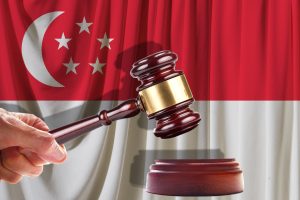Singapore’s former Transport Minister S Iswaran has been sentenced to 12 months in prison in the country’s first high-level corruption case in years. The 62-year-old last week pleaded guilty to accepting gifts worth about S$403,300 (US$313,200) over a period of seven years, from two businessmen who had dealings with the government.
In a hearing this morning, Channel News Asia reported, Justice Vincent Hoong chose to impose a sentence in excess not just of what was requested by the defense, which sought a maximum sentence of eight weeks, but also of the prosecution, which had recommended a sentence of six to seven months.
“I’m of the view it is appropriate to impose a sentence in excess of both parties’ positions,” Hoong told the court, describing both proposed sentences as “manifestly inadequate.” In so doing, Hoong noted “certain aggravating factors such as the total duration of Iswaran’s offending, the high office he occupied, and the overall harm to public interest as well as trust in public institutions,” CNA reported.
A long-time member of the People’s Action Party (PAP) who played an important role in bringing Formula 1 racing to Singapore in 2008, Iswaran was arrested along with hotel tycoon Ong Beng Seng in July of last year. He tendered his resignation to then-Prime Minister Lee Hsien Loong in January, after prosecutors announced 27 charges against Iswaran. These included two counts of corruption under the Prevention of Corruption Act, one of obstructing justice, and 24 breaches of Section 165 of the Penal Code, which forbids public servants from obtaining anything of value from any person with whom they are involved in an official capacity.
Specifically, Iswaran was accused of obtaining valuables worth S$384,340 from Ong. Most of these involved tickets to exclusive events, including the Singapore Grand Prix, Premier League football matches, and West End theater productions. Prosecutors announced a further eight charges in March, involving a further S$19,000 worth of gifts, including golf clubs and bottles of whiskey. These he allegedly received rom Lum Kok Seng, a contractor who had dealings with the government.
Initially, Iswaran pledged his innocence and promised to fight the charges in order to clear his name, and the nation faced the prospect of a protracted and dramatic trial. (The prosecution reportedly planned to call a total of 56 witnesses.) However, on the first day of the trial, the prosecution announced that it was reducing the 35 charges down to just five – four counts of accepting valuable gifts under Section 165, and one of obstruction of justice – to which Iswaran now pleaded guilty. (The other 30 charges were to be taken into consideration at sentencing, which might explain the lengthier sentence.) In so doing, the two corruption charges, each of which carry a prison term of up to two years, were watered down to Section 165 charges, for which the punishments are much smaller.
Why did the prosecutors choose to dilute the corruption charges? The Attorney General’s Chambers (AGC) said that it that it did so after considering the litigation risks involved in proving them beyond a reasonable doubt at trial, “given that there are two primary parties to the transactions, and both would have an interest in denying corruption in the transactions.” The AGC also “considered whether the amendment would lead to a fair and just outcome that is in line with the public interest,” CNA reported.
However, as Singaporean journalist Kirsten Han noted in her newsletter last week, the latter claim is awfully vague, and it is unclear how they determined that the Section 165 charges would be “more in line with public interest than the original corruption charges.”
She noted that many on social media were comparing Iswaran’s missteps to a 2019 case involving a forklift operator who was imprisoned for two months and fined thousands for dollars under the corruption act because he took small bribes from truck drivers wanting to jump the queue. He ended up earning nearly S$5,000 from the scheme, a fraction of the amount that Iswaran is alleged to have received.
One logical conclusion is that for all of the AGC’s talk about the “public interest,” the government wanted to avoid a protracted trial that would showcase the sordid quid-pro-quos between Iswaran and his business contacts, which had the potential to embarrass the PAP. As I noted last week, some observers have argued that Prime Minister Lawrence Wong, who took over the role from Lee in May, is especially keen to avoid the trial impinging on the run-up to the next general election, which is due to be held by November 2025, but could well take place sooner.
In all, it seems as if a negotiated end to the trial was deemed to be in everybody’s best interests – even if it leaves Singaporeans with questions about equality before the law.
































